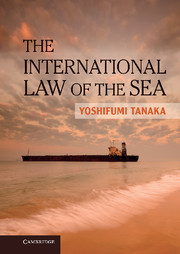Book contents
- Frontmatter
- Contents
- Preface
- Acknowledgements
- Figures
- Tables
- Abbreviations
- Table of Cases
- Table of Treaties and Instruments
- Part I The Divided Oceans: International Law Governing Jurisdictional Zones
- Part II Our Common Ocean: Protection of Community Interests at Sea
- 7 Conservation of Marine Living Resources
- 8 Protection of the Marine Environment
- 9 Conservation of Marine Biological Diversity
- 10 Marine Scientific Research
- 11 Maintenance of International Peace and Security at Sea
- 12 Land-Locked and Geographically Disadvantaged States
- 13 Peaceful Settlement of International Disputes
- Index
- References
10 - Marine Scientific Research
Main Issues
from Part II - Our Common Ocean: Protection of Community Interests at Sea
- Frontmatter
- Contents
- Preface
- Acknowledgements
- Figures
- Tables
- Abbreviations
- Table of Cases
- Table of Treaties and Instruments
- Part I The Divided Oceans: International Law Governing Jurisdictional Zones
- Part II Our Common Ocean: Protection of Community Interests at Sea
- 7 Conservation of Marine Living Resources
- 8 Protection of the Marine Environment
- 9 Conservation of Marine Biological Diversity
- 10 Marine Scientific Research
- 11 Maintenance of International Peace and Security at Sea
- 12 Land-Locked and Geographically Disadvantaged States
- 13 Peaceful Settlement of International Disputes
- Index
- References
Summary
Ocean governance must be based on a sound scientific understanding of the marine environment. Thus it may be argued that the freedom of marine scientific research is a prerequisite of ocean governance. However, marine scientific research or other survey activities in the offshore areas may affect economic and security interests of coastal States. In particular, military survey activities in the EEZ of another State have raised highly sensitive issues between surveying and coastal States. Hence there is a need to achieve a balance between the freedom of marine scientific research and the protection of interests of coastal States. Against that background, this chapter will address particularly the following issues.
What is marine scientific research?
How is it possible to reconcile the freedom of marine scientific research with the protection of interests of coastal States?
Is it possible to carry out hydrographic and military survey activities in the EEZ of another State?
How is it possible to ensure international cooperation in marine scientific research?
Why should the transfer of technology be promoted in oceans governance?
Introduction
Marine scientific research is a foundation of ocean governance in the sense that rules governing the use of the ocean must be based on the sound scientific understanding of the marine environment. Furthermore, marine science can make an important contribution to eliminating poverty, ensuring food security, supporting human economic activity, conserving marine living resources and environment and helping predict natural disasters. Thus marine scientific research is a significant issue in the law of the sea. Indeed, the development of marine science and the law of the sea are intimately intertwined. In this regard, three patterns can be identified.
- Type
- Chapter
- Information
- The International Law of the Sea , pp. 335 - 352Publisher: Cambridge University PressPrint publication year: 2012

